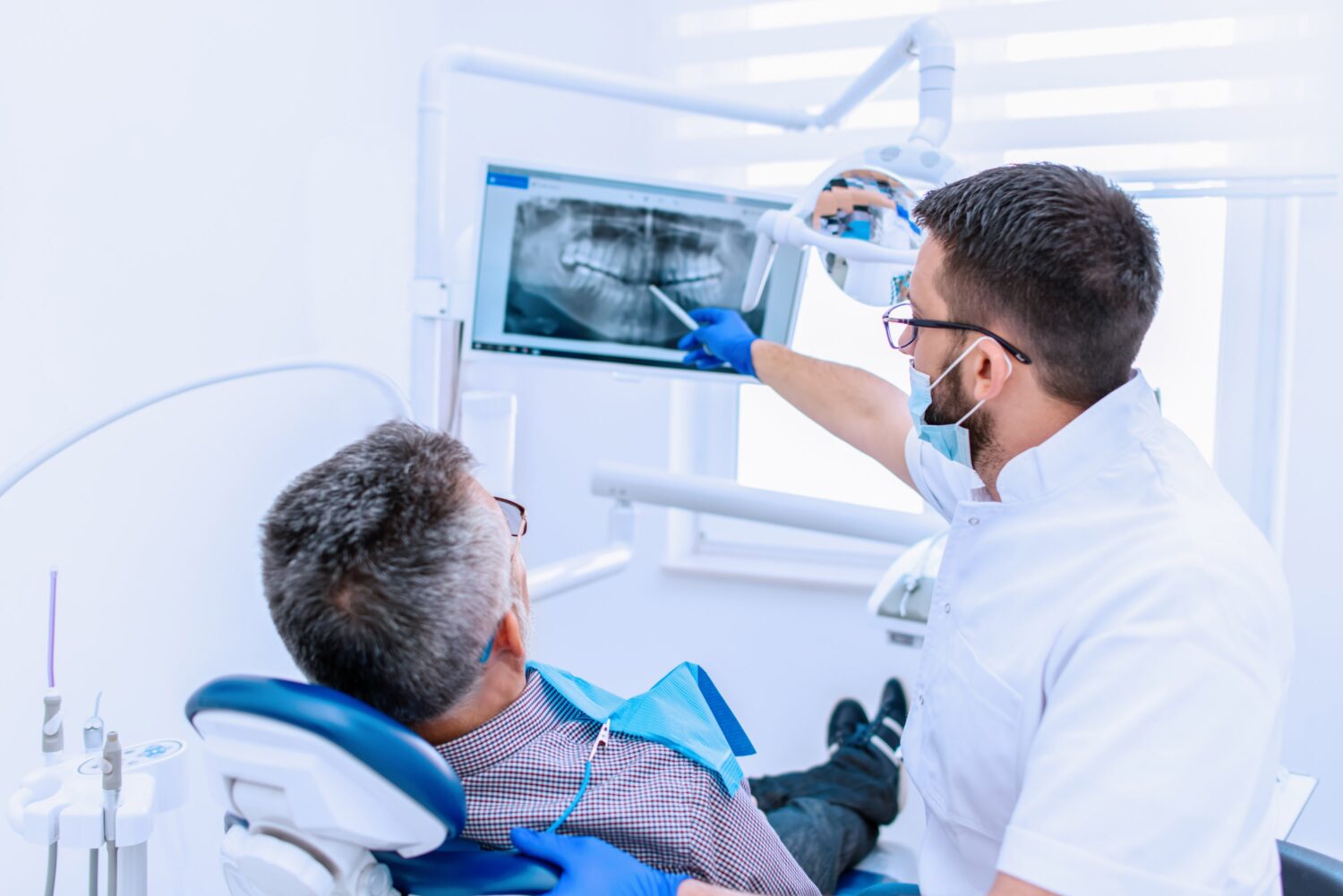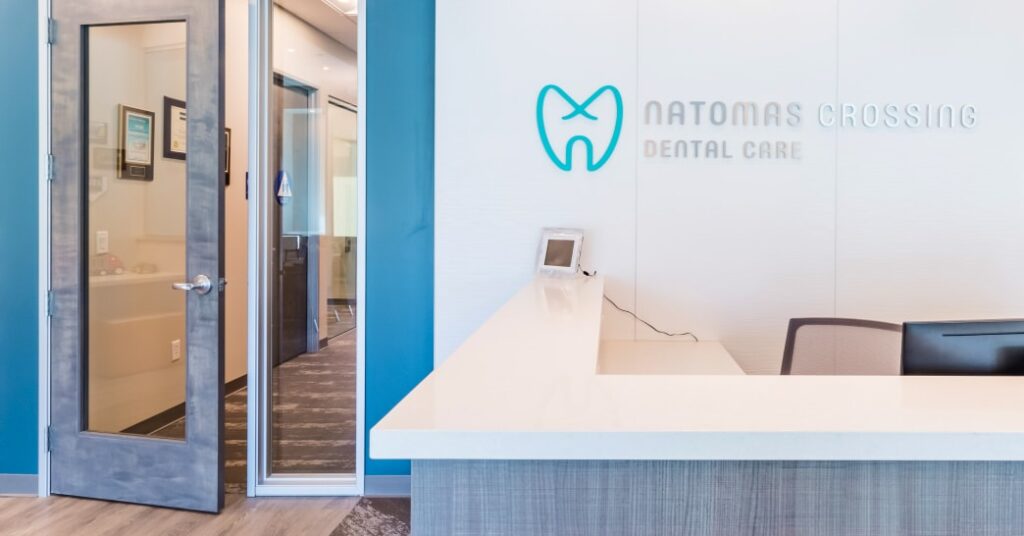Looking for an emergency dentist in Sacramento? Contact Natomas Crossing Dental Care immediately. If you’re seeking an emergency dentist in Sacramento, CA, time is of the essence. Do you know what to do in a dental emergency? Familiarize yourself with the following overview of dental emergencies and emergency dental care tips so you know what to do when one occurs. You may want to print and display this information about dealing with urgent dental situations on your refrigerator or keep it near your emergency phone numbers for easy reference.
Your Trusted Emergency Dentist in Sacramento

Types of Dental Emergencies
The following are examples of common dental emergencies and what you should do if they occur:
Knocked-Out Tooth. Call your dentist immediately or head to the nearest hospital; if you act quickly, it’s possible to save the tooth with emergency dental services. Meanwhile, take the following steps:
- Handle the tooth only by its crown (the part of the tooth you normally see), not the root, to avoid damaging the cells needed for bone reattachment
- Gently rinse the tooth in water (without soap) to remove dirt
- If you can, place the clean tooth back in its socket to prevent it from drying out. Hold it in place with a clean towel or cloth
- If you can’t return the tooth to its socket, place it in a clean container with milk
Broken, Chipped, or Fractured Tooth. If the tooth is chipped or a piece has broken off:
- Rinse the mouth with warm water
- Apply a cold compress or ice pack to reduce swelling
- Save the tooth fragment that broke off
- Use ibuprofen, not aspirin, for pain; aspirin can cause excessive bleeding in a dental emergency
- Call your dentist immediately
Tooth Pushed Out of Position. If a tooth is pushed out of position, take the following steps:
- With very light pressure, use your finger to try to reposition the tooth to its normal alignment
- Bite down to prevent the tooth from moving
Bitten Lip or Tongue. If the lip or tongue has been bitten severely enough to cause bleeding:
- Clean the bite gently with water
- Use a cold compress (a cold, wet towel or washcloth pressed firmly against the area), to reduce or avoid swelling
- Call your dentist and he or she will help determine the severity of the bite
Object Caught in Teeth. Getting something caught in your tooth is uncomfortable. Here’s what you should do if it happens:
- Use dental floss to gently remove the object — never use a metal, plastic, or sharp tool to remove a stuck object
- If you are unable to remove the item with dental floss, give our office a call at 916-928-9999
Toothache. If you’re experiencing a toothache, take the following steps:
- Rinse the mouth with warm water and inspect the teeth to be sure there is nothing caught between them
- If pain continues, use a cold compress to ease the pain
- Do not apply heat or any kind of aspirin or topical pain reliever directly to the affected area, as this can cause damage to the gums
- Schedule an appointment immediately
Broken Jaw. In many cases, a broken jaw is a result of a blow to the head. Severe blows to the head can be dangerous and even life-threatening. If you suspect that the jaw is broken:
- Use a cold compress to reduce swelling
- Call our emergency number (916-928-9999) and/or head to the hospital immediately
A dental emergency can be very serious and should never be left untreated. If you think something is wrong, please give us a call right away.
How to Prevent Dental Emergencies for Children
Follow these tips to help your child avoid dental emergencies:
- Childproof your house to help prevent falls
- Don’t let your child chew on ice, popcorn kernels, or other hard foods
- Always use car seats for young children and require seat belts for older children
- If your child plays contact sports, insist that he or she wear a mouthguard (ask us about creating a custom-fitted mouthguard for your child)
- Prevent toothaches with regular brushing, flossing, and visits to our office

Preparing for Dental Emergencies
It’s a good idea to prepare for dental emergencies ahead of time by creating a dental-care kit. Your kit should contain these items:
- Your dentist’s regular and emergency phone numbers
- Clean handkerchief or gauze
- Small container with lid (for storing a tooth that has been knocked out)
- Ibuprofen (not aspirin)
Keep reading for answers to some of our most frequently asked questions about urgent dental care.

Why Choose Us as Your Emergency Dentist in Sacramento
When every second counts, Natomas Crossing Dental Care stands out as your trusted Sacramento emergency dentist. We offer same-day emergency appointments to help relieve tooth pain fast and preserve your smile. Whether you’re dealing with a broken tooth, lost filling, or dental trauma, our experienced team is here to help with expert care and compassion.
Our Sacramento-based dental clinic is equipped to handle a wide range of emergencies, from dental implant concerns to dental crown repairs, right when you need it. We proudly serve clients in Sacramento and West Sacramento, making access to urgent emergency dentistry simple and stress-free. With a patient-first approach focused on comfort, clear communication, and quick response, we help you feel at ease, even during a dental crisis.
To learn more about the team behind your care, meet our experienced dental professionals in Sacramento. At Natomas Crossing Dental Care, we make your dental emergency our top priority.
Frequently Asked Questions
What would you need emergency dental care for?
The most common dental emergencies occur when injuries to the mouth result in teeth that are knocked out, loosened, fractured, or forced out of position. Painful cuts to gums, lips, or cheeks during an injury should be treated by your dentist, too. Some non-emergency situations, such as toothache or objects caught between the teeth, are serious enough to warrant a call to the dentist as well.
How soon should I see a dentist after an injury?
Getting to an emergency dentist within 30 minutes can make the difference between saving and losing a tooth. An emergency tooth extraction may need to be performed right away, too.
Is there something I can do before I see the dentist?
Depending on the type of emergency, there may be care you can apply right away before you come in. Information on this is outlined above.
Hear From Our Happy Patients

